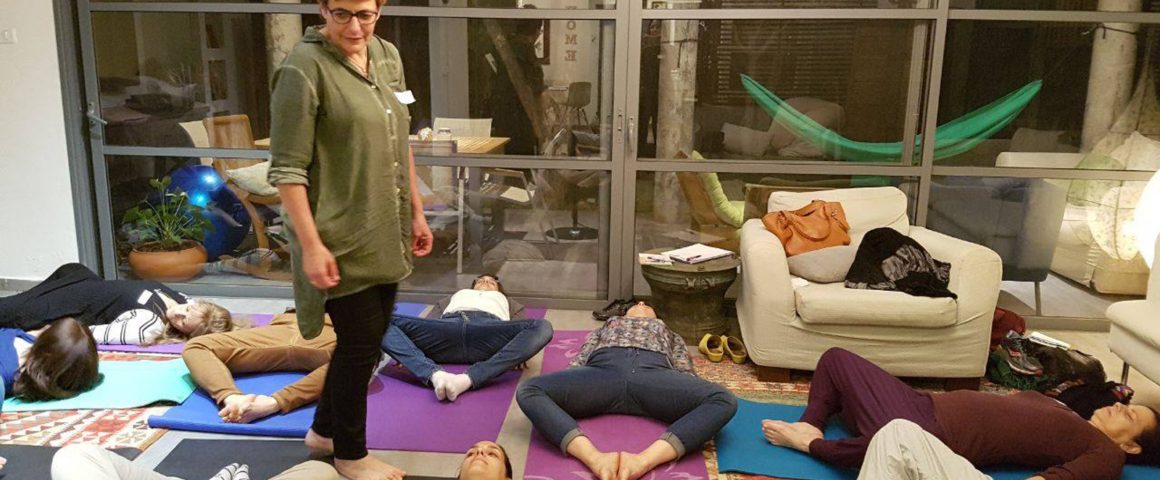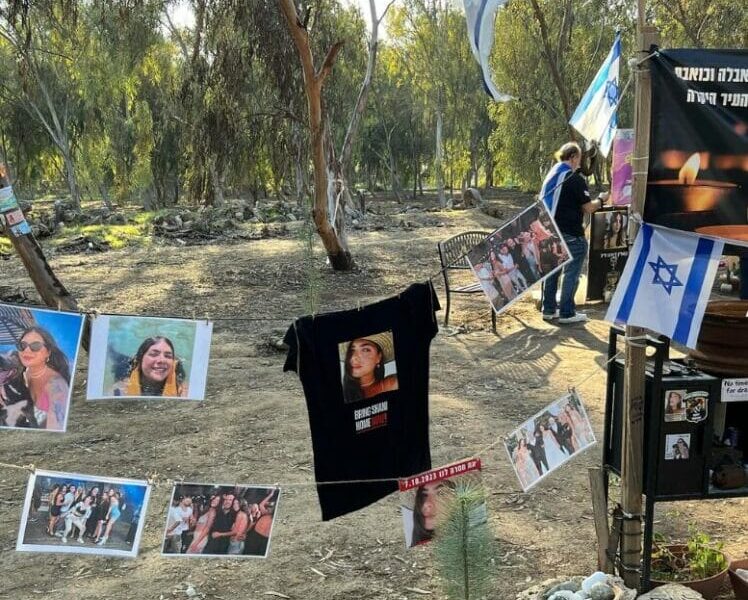Pictured above: Anya Bloom (standing) leads people doing TRE in an Introductory Workshop, Ramat HaSharon, Israel, April 24, 2017.
Phoenix resident David Berceli, Ph.D. developed Tension and Trauma Releasing Exercises™ (TRE) after working in war-torn areas. He realized in areas with widespread trauma; there weren’t enough psychotherapists to provide treatment. So Berceli developed simple movement techniques to elicit the body’s own natural tremor response to release the stored tension in the body. TRE can be taught in a group setting, and most people can do TRE on their own as a self-help method after learning the movements.
In 1995 and 1996 Dr. Berceli gave training sessions in TRE both in Israel and the West Bank. He found that after learning about trauma and doing TRE, both groups were able to feel more connected and safe, and care about each others’ pain. In a city filled with violence, people can be in a room of five people, and sense that one room is safe, while the rest of the world appears dangerous. “I was surprised by it too,” he says, especially when there were bus bombings in Jerusalem during the time he was teaching there. “I was fascinated when three or four of us hid in the same doorway and felt safe there with each other, felt safe in the midst of violence; safety is relative according to the context.”
Berceli has been back to the region since then, but he no longer does TRE training now that an Israeli, Anya Bloom, has become certified as a trainer. Bloom is “very dedicated and persistent,” says Berceli.
Bloom came to TRE after many years of working as a physical therapist, from what she described as a “conventional background but aware of mind-body connections.” Six years ago she met South African Melanie Salmon, who introduced TRE to South Africa. When she told Bloom about it in detail, the method “immediately made sense,” says Bloom, who liked that it was entirely physical, without a need to talk about the experience. She also liked that it could be taught in a group and that it was a tool that people could be empowered to use on their own. When she decided to learn to teach TRE, she knew that she would go on and become a person to train other providers, and Salmon told her to learn directly from Berceli, so Bloom studied with him in the United States and Europe.
Bloom sees a great need for TRE for many reasons. Most adults in Israel are veterans. She noted that while there are people who are recognized as injured by serving in the military, others carry effects of post-traumatic stress as well. There are also other aspects of trauma, such as the vicarious trauma of knowing others who have experienced traumatic incidents from the Holocaust, war or terrorism. She noted that trans-generational trauma (the effects of trauma on subsequent generations) is well documented among families of Holocaust survivors. And there is the trauma experienced by Palestinians from war and displacement, and there is also a large part of the Sephardic Jewish population who experienced displacement. Because of her perspectives working in a country with such a high degree of trauma as part of the culture, she wrote a chapter on trans-generational trauma in Berceli’s book about TRE, Shake it Off Naturally.
With this widespread prevalence of trauma in Israeli society, most people do not label it as such. “They talk more about stress and find hearing about TRE very interesting, yet it can be a very big step for people to take the next step of experiencing it,” says Bloom.
Still, quite a few people are taking that step. When I spoke with Bloom while I was in Netanya, Israel shortly before the High Holy Days, she had just taught a Module I class in Jerusalem, the first step for people seeking to become TRE providers and teach others. Not counting the eight people in that class, there are eight to 10 other people in the process of becoming certified as providers, some close to finishing and others at the beginning. They will join the six other providers currently certified, some along the coastal area, and the newest in the Jerusalem area.
While Bloom still facilitates some groups where people can come and learn to do TRE as a self-help method for their own use, she spends most of her time training others to become providers, and spreading the word about TRE throughout the population. Fiona Leibowitz is a trainer who works in several countries, and she both facilitated and co-facilitated two TRE training sessions this past year in Tel Aviv. She will be training again in Tel Aviv beginning in April.
Bloom sees a need in so many places, among veterans, elders, refugees, children – really the whole population. Reflecting on her own life, Bloom says, “having an 18-year old, I see the importance of building resiliency as young people go through changes in their lives.” So Bloom is exploring steps to make TRE more accessible to young people at the end of their high school years who are needing to choose their life paths.
In the Phoenix area, Susan Shifman is a member of the Jewish community who works with both individual clients and also trains providers. In working with clients healing from trans-generational trauma, she notes that they did not identify that initially as the issue when they showed up seeking help for stress and depression.
After several visits utilizing TRE, these clients began sobbing for what had happened to family members, grandparents, parents, aunts, uncles, and for one, a brother who was in a displaced persons camp as a young child. They connected more deeply to the stories they had been told by family members, of Kristallnacht (November 9, 1938, when more than 250 synagogues were burned, more than 7,000 Jewish businesses were sacked and looted, and tens of thousands of Jews were sent to concentration camps), and of the loss when there were large families living in small towns and villages and everyone knew everyone, and the shul was such a gathering place. TRE helped them “to connect emotions to memories,” says Shifman. “It was very profound.”
To learn more about Susan Shifman and TRE in the Phoenix area, visit tre-arizona.com/about.
And to learn more about Anya Bloom’s project of providing TRE to young people, visit tre-israel.com.






